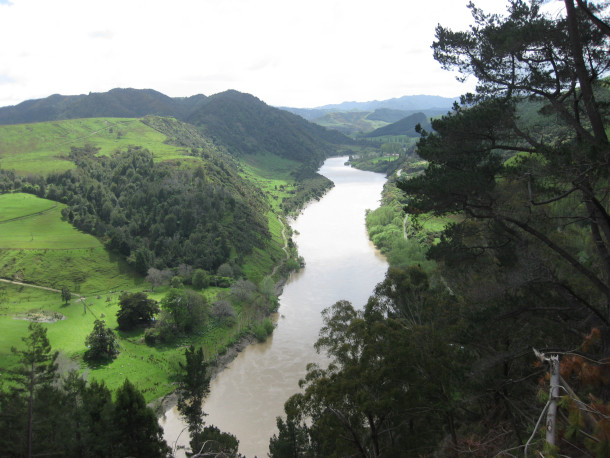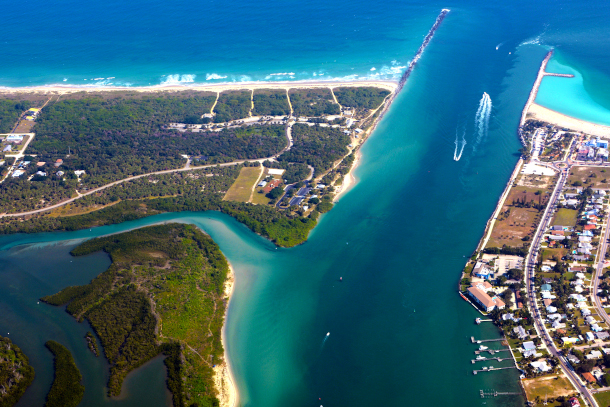A Fight Over Rights of Nature in Florida
Air Date: Week of February 4, 2022

The Whanganui River is a major river in the North Island of New Zealand that has been granted rights of personhood. (Photo: Felix Engelhardt, Wikipedia Commons, CC BY 2.0)
Rights of nature laws elevate nature to have similar legal rights to humans, and in Orange County, Florida local communities are citing these laws to try to protect water ways from development. Host Bobby Bascomb speaks with journalist Katie Surma about the ongoing battle between Orange County and the state legislature over granting rights to nature.
Transcript
BASCOMB: While many federal governments continue to drag their feet on seriously addressing the climate crisis local communities around the world have already begun taking action, in part, by enacting rights of nature laws. A doctrine rooted in indigenous thinking, rights of nature laws elevate nature to have the same legal rights as humans. Such laws have been enacted in some 17 countries around the world and more than 30 US communities. In Orange County, Florida a challenge to an existing rights of nature law is working its way through the court system. The case includes five water ways suing a developer. Katie Surma is a reporter for Inside Climate News who has been following the case and joins me now. Welcome to Living on Earth, Katie.
SURMA: Thank you so much, Bobby. It's great to be here.
BASCOMB: So what are the rights of nature? And how is it different from current environmental policy?
SURMA: The rights of nature is a somewhat unorthodox legal movement that aims to give elements of nature, so most often its rivers or other waterways, legal rights in the same way that humans have human rights. And it's different from traditional environmental law, which is usually human centered, or some people say anthropocentric?
BASCOMB: And how would the rights of nature maybe come into conflict with our notion of personal liberty and property rights, that sort of thing.
SURMA: In the United States, our Bill of Rights, it protects humans from government interference of some sort. And that puts a priority on things like property rights, and the rights of nature, you know, sort of lifts up natural beings on par with humans. And so those things will come into conflict with, you know, personal property, when you own land, you have the right to destroy it, generally.
BASCOMB: And there's a case right now in Orange County, Florida, that really highlights the potential for the rights of nature measures. Can you tell us about that case? What's going on there?

An agricultural farm in Nagapattinam, Tamil Nadu, India. (Photo: Matthew T Rader, Wikipedia Commons, CC BY-SA 4.0)
SURMA: Yeah, and this is a really interesting case, because it kind of cuts to one of the central issues that a lot of these rights of nature provisions in the United States are facing, which is that, you know, local communities are enacting laws that recognize the rights of nature. And at the same time, state legislatures are preempting them and saying you can't do that. In 2019, people started campaigning to recognize the rights of waterways. As this campaign is going on, the state legislature slipped a couple phrases into a bill that was about to pass, saying that Orange County can't do this. Well, voters went to the polls a few months later, and this is in 2020, during one of the most divisive elections, I think we've seen in a long time. And 89% of the County voters said yes, we want to recognize the rights of nature. And you had this sort of showdown between the state legislature and the county. Well, those waterways that now have rights filed a lawsuit against a developer, saying that the planned development project will impinge on the rights of these waterways, by polluting them by stopping water flowing. And so the case is now in litigation. And what the defendants are trying to do the defendants are the developer and the state environmental protection agency. They want to dismiss the case saying it's preempted. And also we haven't even issued the permit yet. So this isn't right for litigation. Plaintiffs the waterways and a gentleman named Chuck O'Neal, who's the main advocate behind these laws in Orange County in Florida, has thrown up a whole bunch of arguments to the court to try to make this law stick and enforce the rights of the waterways. And, and one of the things that they're arguing is that the state can't preempt this law that we have an inherent right as a charter county to self-govern, and that the state is going to enact environmental legislation, that it's a floor, not a ceiling. So a floor being the basic minimum, and local communities can then enact environmental protection that's more stringent. And this is something that's come up in Florida in a number of other areas. So local communities trying to act more stringent laws on mask mandates, on banning straws, for instance, sunscreen that has chemicals in it that kill coral reefs, and the state trying to preempt those laws. So it's an interesting issue. And it's going to be really interesting to see what happens.

The Fort Pierce Inlet in Fort Pierce, Florida. (Photo: D Ramey Logan, Wikipedia Commons, CC BY-SA 4.0)
BASCOMB: Florida is an interesting example. I mean, it's not exactly a blue left-leaning state that you might expect to get behind something like this. The state did vote for President Trump, though Orange County, I understand went for President Biden. Why do you suppose voters there are so persuaded by this argument about the rights of nature?
SURMA: Sources there have told me is that Florida in particular people there are very connected to the environment, it's not only huge for the economy, tourism is a big chunk. But Florida—it's beautiful. People love their natural surroundings, and they see what's happening. For instance, a major problem are toxic algae blooms that, well, they can be naturally occurring. They're fueled by agricultural runoff. And so, when those algae blooms happen, it sucks up oxygen in the water, it kills off in one case 1000s of tons of wildlife. People see it, they smell it, it hurts human beings too, and they want to stop it. And so whether you're left right center somewhere else, people are getting behind this idea because they see it happening. They're experiencing it themselves and they know something's wrong.
BASCOMB: Well, it's easy to see how maybe industry and agribusiness wouldn't be too happy with nature having rights in this way. What kind of pushback are you hearing?
SURMA: Again, what sources are telling me is that the agricultural business in particular has pushed back. They were also a big player in Ohio, where folks in Toledo tried to enshrine the Lake Erie Bill of Rights protecting Lake Erie. It's threatening to business, you know. If nature has legal rights, then people and businesses and the government are going to have new obligations.
BASCOMB: Well, what would if nature had rights, especially waterways that we've been talking about? What would that disallow? I would imagine, you know, pollution. But does that also mean fishing? You know, recreating on the river? Where is the line of what's allowable?
SURMA: Yeah, advocates say, you know, this isn't about criminalizing or prohibiting cutting down a tree or shooting a deer. It is about maintaining the integrity of ecosystems as a whole. So making sure that they can regenerate because right now, the pace of change, you know, from human pollution and just humans acting on their environment, it's outpacing the ability of ecosystems to adjust and to keep going. So the idea is not, you know, an ant is going to have rights and it's going to stop a major development project. It's, you know, elevating the interests of nature to a place where it has a greater say in governance, governing decisions, what projects get greenlighted and what doesn't. No one really knows how this is going to work out because it's a new legal idea. And we kind of have to wait and see how, you know, the courts, the courts implement it.
BASCOMB: Katie Surma is a reporter with InsideClimate News. Katie, thank you so much for chatting with me today.
SURMA: It was my pleasure. Thank you for having me.
Links
Living on Earth wants to hear from you!
Living on Earth
62 Calef Highway, Suite 212
Lee, NH 03861
Telephone: 617-287-4121
E-mail: comments@loe.org
Newsletter [Click here]
Donate to Living on Earth!
Living on Earth is an independent media program and relies entirely on contributions from listeners and institutions supporting public service. Please donate now to preserve an independent environmental voice.
NewsletterLiving on Earth offers a weekly delivery of the show's rundown to your mailbox. Sign up for our newsletter today!
 Sailors For The Sea: Be the change you want to sea.
Sailors For The Sea: Be the change you want to sea.
 The Grantham Foundation for the Protection of the Environment: Committed to protecting and improving the health of the global environment.
The Grantham Foundation for the Protection of the Environment: Committed to protecting and improving the health of the global environment.
 Contribute to Living on Earth and receive, as our gift to you, an archival print of one of Mark Seth Lender's extraordinary wildlife photographs. Follow the link to see Mark's current collection of photographs.
Contribute to Living on Earth and receive, as our gift to you, an archival print of one of Mark Seth Lender's extraordinary wildlife photographs. Follow the link to see Mark's current collection of photographs.
 Buy a signed copy of Mark Seth Lender's book Smeagull the Seagull & support Living on Earth
Buy a signed copy of Mark Seth Lender's book Smeagull the Seagull & support Living on Earth

